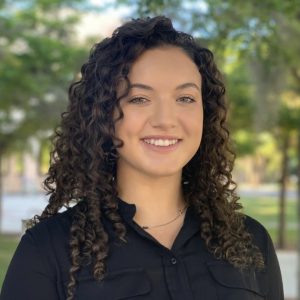Student shark researcher earns competitive Florida award
 Catching, tagging and releasing bull sharks in the Manatee River is arduous scholarly work—often reserved for post-graduate professional researchers. But New College thesis student Cecilia Hampton—an undergraduate—is on the cutting edge of this effort, and her contributions are already garnering accolades.
Catching, tagging and releasing bull sharks in the Manatee River is arduous scholarly work—often reserved for post-graduate professional researchers. But New College thesis student Cecilia Hampton—an undergraduate—is on the cutting edge of this effort, and her contributions are already garnering accolades.
The marine biology major just earned a $5,000 Guy Harvey Scholarship Award from the Guy Harvey Ocean Foundation—an honor given to up to seven students enrolled full-time at state higher education institutions who are “conducting research related to the biology, ecology, habitat or management of fish in Florida’s ocean environment.” Hampton will be using the funds to purchase supplies for her senior thesis.
“I’m studying a nursery habitat for bull sharks, Carcharhinus leucas, in the Manatee River, and whether the sharks are affected by the noise pollution created during construction,” Hampton said. “I’m using acoustic telemetry to track the movements of about two dozen very young bull sharks.”
Hampton has worked directly with New College Associate Professor of Biology Jayne Gardiner, Ph.D. on this undertaking. Gardiner extensively studies sharks in Sarasota Bay, Terra Ceia Bay and the Manatee River, and she includes students like Hampton in the process to give them up-close-and-personal fieldwork experience.
Gardiner is not surprised that Hampton earned the Guy Harvey Scholarship Award; she has been one of her most dedicated student researchers since she started at New College as an Isermann Medal recipient.
“It’s a big deal that Cecilia got the Guy Harvey Award; it usually goes to graduate students,” Gardiner said. “Cecilia is just a phenomenal student and I’ve had the pleasure of working with her since her first year. She’s really been building up to this since her first day on campus. She’s where you’d expect a master’s or Ph.D. student to be, and she’s an undergrad.”
Hampton has also collaborated with Athena Rycyk, Ph.D., an assistant professor of biology and marine science at New College, on researching manatee vocalizations. Both of Hampton’s efforts focus on how marine animals respond to outside distracting influences like construction and noise pollution.
“Cecilia is working with me to analyze the bull sharks’ movements, and with Dr. Rycyk to analyze the underwater sound levels in their habitat before and during construction activities. We currently have no idea how these animals respond to noise pollution, and that’s part of why her research is so important,” Gardiner said. “I also think Cecilia has a really unique skillset for an undergrad—so much experience with multiple types of advanced technology. She knows how to analyze these complex types of data (which requires specialized knowledge like being able to code).”
For example, Hampton is well-versed in acoustic telemetry (animal movement-type data that involves using equipment for detecting sharks that are tagged with acoustic transmitters), as well as using underwater hydrophones (sound-recording devices).
“She’s analyzing the frequency and amplitude, or ‘loudness,’ of the underwater soundscape in the environment, and I think she’s going to have a huge impact,” Gardiner said.
How does Hampton do what she does, exactly?
After she catches, tags and releases the bull sharks she studies, she maintains the equipment that is used to monitor their activities.
“This involves placing equipment on the riverbed in the Manatee River, and then, at a regular interval (depending on battery life), retrieving it to change the batteries and download the new data,” Hampton said. “I’m currently using a multitude of software, including R and MANTA, to process and begin to analyze my preliminary data.”
Hampton is comparing the data she collects to background noise values acquired from submerged hydrophones.
This feeds into the Tampa Bay Environmental Restoration Fund’s Status and Trends of Sharks in Tampa Bay project—funded by a three-year, $165,111 grant that allows New College researchers like Hampton and Gardiner to study local sharks. New College researchers are currently evaluating habitat use, movement patterns and residency of great hammerheads and blacknose sharks in Tampa Bay, as well as assessing the effects of climate change and coastal development on blacktip and bull sharks. The project provides hands-on research training for undergraduate students from underrepresented groups, which supports diversity in estuarine science.
“Using the results I find, I will attempt to grasp how the background noise produced by construction activities affects the habitat usage and behavior of young bull sharks in their nursery,” Hampton said.
This will undoubtedly influence the future work of scientific researchers statewide, as they attempt to protect bull sharks and other marine life throughout Florida.
And, to add to Hampton’s recent accomplishments, she was one of the co-authors of an article published on October 21 entitled First Characterization of Vocalizations and Passive Acoustic Monitoring of the Vulnerable African Manatee (Trichechus senegalensis) in the prestigious Journal of the Acoustical Society of America. Several of the other authors are from New College, including Rycyk, 2021 alumnae Karianne Kapfer and Emily Garcia, and thesis student Hannah Nations.
“I greatly enjoyed the collaboration we achieved and I’m proud to be a published author so soon,” Hampton said. “Overall, I have been incredibly lucky and fortunate at New College to have participated in so many amazing projects, and to work with such incredible people on fascinating animals and subjects.”
Abby Weingarten is the senior editor in the Office of Communications & Marketing.
